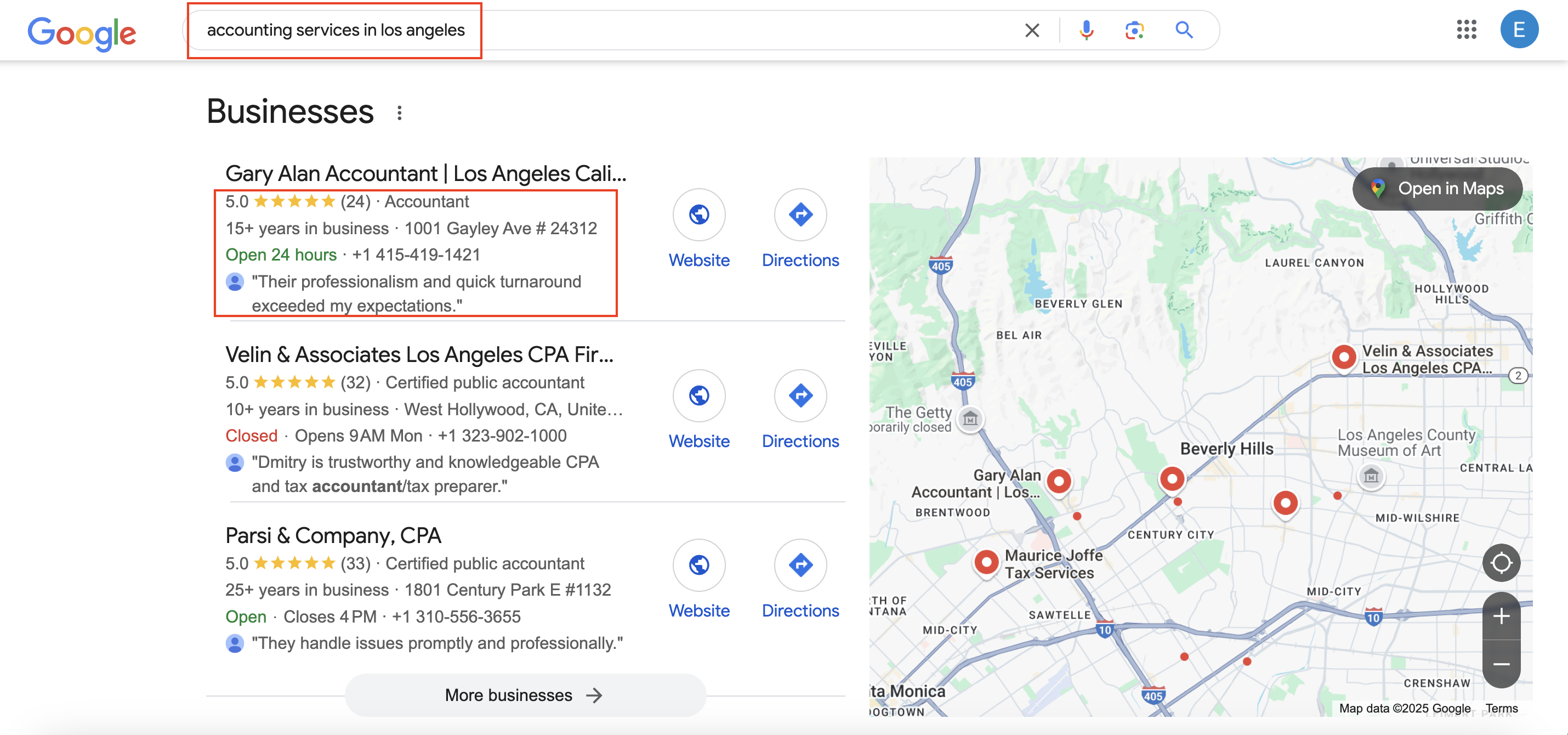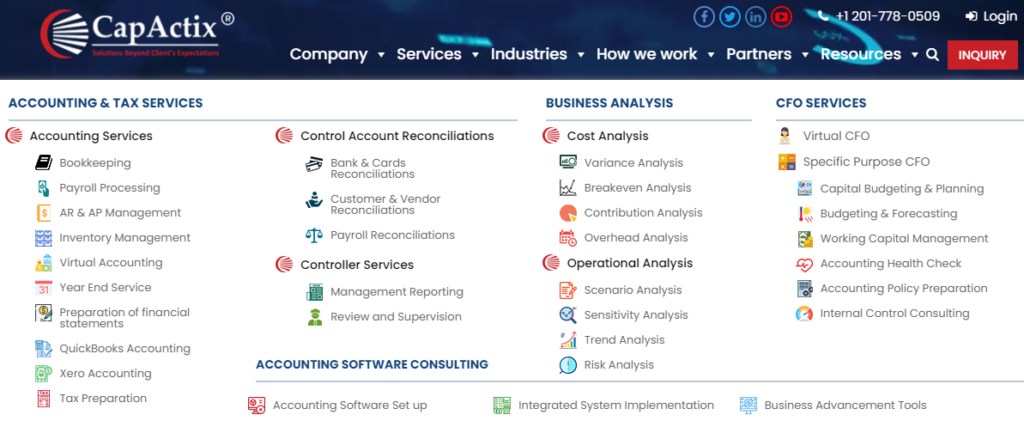If you are not in the Big Four of accounting firms, you must work hard to build credibility for your services.
With around 138,000 accounting companies in the US and around 1,490,000 accounting firms worldwide, you face tough competition vying for your target audience’s attention.
Your potential customers need to be able to find your website and services on search engines like Google and this is what SEO for accountants does.
What’s SEO for Accountants
We wouldn’t say SEO for accountants drastically differs from SEO in general. Search engine optimization works with the same scheme everywhere:
- you publish a website with relevant content and high technical performance
- search engines crawl the web and find your site, matching you with the keywords and terms people use
- you get a good ranking based on the search engine’s algorithm: the more relevant your site is to the user’s query, the higher it will show
Key Components of Successful SEO
Imagine your website and Google’s search results are like two key components of a larger system.
SEO acts like the connecting mechanism—much like an HDMI cable links a device to a TV or audio cables connect sound and image. Only when all technical elements are properly aligned and plugged into the right ports can the information flow smoothly, ensuring your website is seen and understood by Google.
The key elements you should use to ensure SEO success include:
Keywords
Keywords are the phrases or words people use to describe to Google what they want. And if your website’s content is not just about what you find relevant for your customers but for the keywords you know your target audience is searching for – the first cornerstone of SEO is set.
Keyword research is a pretty simple process, given the abundance of tools – both paid and free – you can use to identify the best keywords for your business. Tools differ in technicalities and depth – but the core mechanism is the same. You enter the broad topic of your website, and the tools generate a list of relevant keywords to choose from.
For example, Ahrefs shows over 10,700 queries customers used to find information about accounting services.

You get this vast data in a matter of several clicks. The real game starts when you filter the keywords and understand their specific value for your business.
Writing content for each and every keyword searched by your target audience is not practical, and it’s less likely to generate desired results. A magical thing – search intent – is what you need to understand before deciding which keywords to use.
Search Intent
It is as simple as that: the search intent is the intent users have when searching for something.
When they search for “accounting services for small businesses,” they aim to find companies suitable for small business budgets and specifics. These people look for niche accounting companies that specialize in and understand the nuances of small business accounting.
If they discover a large-scale accounting firm in response to their query focused on working with large enterprises and have testimonials and case studies from Fortune 500 companies – it’s not what they’re looking for and likely won’t have a high conversion rate.
The verdict – you DO NOT need to optimize your website for “accounting services for small business keyword” if you are not targeting small businesses and do not provide accounting services for them.
You need to choose keywords that:
- align with your target audience
- match what you offer
- reflect the search intent of your potential customers
Create a great keyword list based on these factors, and be sure whatever SEO work you do after that leads you in the right direction.
On-Page and Off-Page Optimization
These two core SEO directions should be done simultaneously to bring results.
An on-page SEO works with whatever happens inside your website. It’s about all the optimizations you can do to make your pages easily readable for search engines:
- optimizing page titles and meta descriptions
- using proper heading tags
- improving website speed
- creating quality content
- removing duplicate content
- using alt tags for images
- implementing schema markup, and so forth.
The other end of the spectrum is off-page SEO which has to do with everything that happens outside your website but impacts your Google ranking. This includes:
- building backlinks from other websites
- improving brand reputation and online presence
- promoting your website through social media channels
- creating shareable content to generate more traffic
- getting listed on business directories and review sites, etc.
An on-page SEO ensures your website “passes the quality control of Google” and is allowed to rank higher. Off-page SEO, on the other hand, is about actively promoting your website to increase its online visibility and authority.
Local SEO
And here’s something that’s not relevant for every niche business but is quite important for accounting companies. Local SEO is the tactic you should employ if you have a physical location (or not) and want to target customers within a specific geographic area.
With local SEO, you can optimize your website for “near me” searches, use location-specific keywords in your content, and create citations on local business directories.
In SEO for accountants, you need this extra layer of geographical targeting to ensure your website shows up when someone in your area searches for accounting services. For example, Gary Alan Accountant shows up first in the search results list when someone searches for “accounting services in Los Angeles” or similar.

You can imagine the results this brings for their business, right? The vast majority of people in the neighborhood interested in accounting services will call them, visit their website, drop by their office, or at least save their contact information for later use.
That’s the power of local SEO.
Tangible Results of SEO for Accountants: Why It’s Worth the Investment
Most businesses spend between $500-$5,000 on SEO per month. Given that the cheapest accounting services – basic bookkeeping costs between $300 – $2,500 a month, you have a very high chance to pay off your investment quickly.
Roughly calculated, if you get 2 clients per month from SEO and retain them for 1 year, you’ll earn a revenue of $7,200 – $60,000. That’s almost a 100% return on investment in just the first year!
But with good and consistent SEO efforts, you’ll hardly have only 1-2 clients per month. The SEO results are not immediate, but once you come on track with many relevant keywords holding stable rankings, you enjoy a consistent inflow of new leads from organic traffic.
So, get down to brass tacks and integrate the below strategies into your marketing strategy.
6 Proven and Tested SEO Tactics for Accounting Businesses
With basic SEO knowledge and the right tools, you can start the process yourself, trying to scale later. But if you’re serious about getting good results, we highly recommend you hire an experienced SEO specialist or outsource SEO operations to a specialized agency, so every dollar spent on SEO is directed to achieving your goals faster.
#1 Your main keywords, your site/meta descriptions
Once your accounting website is live, the first info you should provide for CPA SEO purposes is through the site description. There you should mention what services you offer, where you are based, and mention the benefit of working with you.
Here’s the site description of Raben CPA, a CPA firm in Las Vegas:

Once you start publishing service pages, blog posts, etc, all of them should have meta descriptions. While the site description is broader and talks about your services in general, page descriptions are more specific and contain narrower keywords.
#2 Differentiate the right and wrong keywords
“Tax help” might seem a perfect keyword for doing SEO for tax preparers because you offer that service. Plus, it has 6,600 monthly searches only in the USA (according to Ubersuggest).
But that keyword is too broad and the searcher intent is not understandable.
Besides, ranking high for that keyword will be almost impossible as most government websites rank on the first page.
You should go more specific! It may be through specifying a location (state, city) and/or adding other parameters (e.g. “for small businesses” or “for self-employed”).
To guide you even further in choosing the right tax preparation keywords, let’s have a look at the screenshots below. When you type “accounting firms in chicago”, you get this list of keywords.
NOT all of the suggested keywords are worth targeting as many of them are irrelevant to your business. For example, “accounting firms in chicago” would be a great blog post topic if you were situated in Chicago. You could make a list of the top 10 firms, including yours, and show your advantages over the others.
However, targeting the keyword “accounting firms hiring in chicago” would be unprofessional. This keyword is searched by jobseekers, not accounting firm clients.

#3 Accountant directories are the first step to building links
When you are first starting to build your tax and accounting firm’s online reputation, receiving many links is not easy. You start with submitting your website to high-quality directories.
CPA Tax Accountant Firm Finder is one of the many websites that link to accounting firms and help find a service provider in your preferred location.

TaxBuzz is another source, though it’s focused on listing accounting professionals rather than firms. So it will be more suitable for SEO for accountants.

Another way to build links for CPA SEO is to write guest blogs on high-quality accounting-related websites.
The best place you can publish guest posts to boost SEO for tax preparers is on the websites of SaaS companies that offer accounting software. They aren’t your competitors but they cover similar topics on their blogs and you have the perfect chance to get links.
#4 Decide who you target and what’s your offer
Some businesses want to work only with CPAs (certified public accountants), while others need only bookkeepers to track and organize financial transactions. Some businesses need consulting services as well, while others only need financial matters handled.
You should clearly understand what services you offer and consequently what buyer personas you have.
Besides, you should have a perfect understanding of the industries you are going to serve. For example, ORBA offers services to dental, healthcare, law, manufacturing businesses, real estate agencies, restaurants, and nonprofits.

CapActix works with more industries, including agriculture, retail & eCommerce, and power generation.

Now you think what your buyer personas have to do with SEO for accounting firms. Well, it helps you create a search engine optimized website copy for your future customers and reach them more easily.
The same principle works for service pages. You can’t write a search-engine-optimized copy if the list of your services is not clear. The example below is again from CapActix. Every button leads to a separate service page that describes the service scope in detail and using appropriate keywords.

Accounting services include tax planning, payroll processing, audit, etc and it’s your task to inform your prospects in advance.
#5 Invest in a fast-loading, secure, and user-friendly website
Technical issues can ruin all the hard work that you’ve put in while creating high-quality CPA website content for your website. Some of the SEO issues (technical and not only) include but aren’t limited to
- Your website isn’t secure
- The website isn’t mobile-optimized
- The website is loading in more than 2-3 seconds
- Meta descriptions are the same for all pages or are missing
- There’s duplicate content on the website with no canonical tags
- There’s duplicate content on the website with no no-index tag, etc
Here we have a separate article dedicated to 7 SEO Problems You Can Detect and Fix Right Now.
#6 Create and optimize your Google My Business profile
Though not a directory, Google My Business is a top place for receiving customer reviews, showing your credibility, and boosting your SEO for CPA/accounting firms.
GMB allows you to list your NAP (Name, Address, Phone number), describe your company, and show searchers what others are talking about your services. If you want to be visible on the local pack and Google Maps, you should have a GMB profile.
See your accounting website ranking with the help of the Andava team

SEO keywords for accountants should be picked with a deep strategy in mind. Then, hard work is required until your website is technically and contextually ready to compete with major players in search engines.
The Andava team is here to conduct a free audit of your website on SEO for accountants and present a list of practical, personalized recommendations.